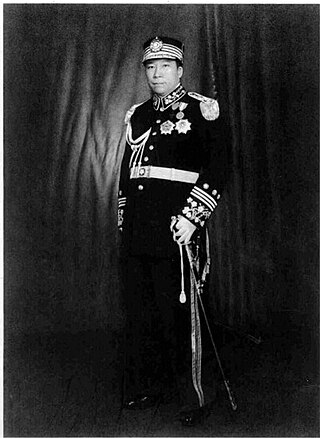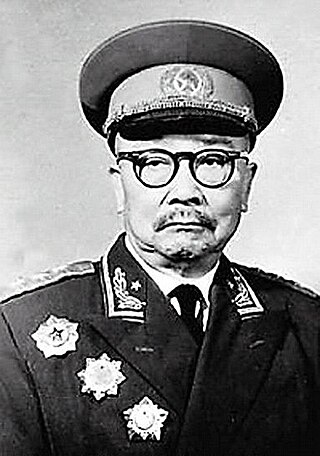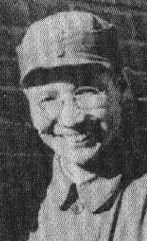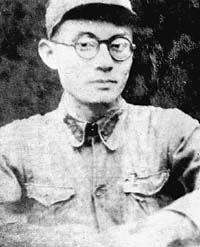
The Chinese Civil War was fought between the Kuomintang-led government of the Republic of China and the forces of the Chinese Communist Party (CCP), with armed conflict continuing intermittently from 1 August 1927 until Communist victory resulted in their total control over mainland China on 7 December 1949.

The Xi'an Incident was a major Chinese political crisis from 12 to 26 December 1936. Chiang Kai-shek, leader of the Nationalist government of China, was placed under house arrest in the city of Xi'an by a Nationalist army he was there to review. Chiang's captors hoped to end the Chinese Civil War and confront Japanese imperial expansion into Chinese territory. After two weeks of intense negotiations between Chiang, his captors, and representatives of the Chinese Communist Party (CCP), Chiang was released with a verbal promise to end the civil war and put up a firmer resistance to Japan.

Liu Mingzhao, courtesy name Bocheng, more commonly known as Liu Bocheng, was a Chinese military commander and a Marshal of the People's Republic of China.

Song is the pinyin transliteration of the Chinese family name 宋. It is transliterated as Sung in Wade-Giles, and Soong is also a common transliteration. In addition to being a common surname, it is also the name of a Chinese dynasty, the Song dynasty, written with the same character.
The 28 Bolsheviks were a faction in the early Chinese Communist Party (CCP). The faction was formed among Chinese Communists studying at the Sun Yat-sen University in Moscow during the late 1920s and early 1930s. They received their nickname because of their strong support for the orthodox political positions advocated by Joseph Stalin and Pavel Mif. The leaders of the faction included Wang Ming, Bo Gu, Luo Fu, He Zishu, Wang Jiaxiang, and Shen Zemin. Sun Yat-sen University closed in 1930 and the students made their way back to China.

Qin Bangxian better known by his alias Bo Gu, 14 May 1907 – 8 April 1946) was a Chinese senior leader of the Chinese Communist Party and a member of the 28 Bolsheviks.

Yang Hucheng was a Chinese general during the Warlord Era of Republican China and Kuomintang general during the Chinese Civil War.

The Second United Front was the alliance between the ruling Kuomintang (KMT) and the Chinese Communist Party (CCP) to resist the Imperial Japanese invasion of China during the Second Sino-Japanese War, which suspended the Chinese Civil War from 1937 to 1945.

Li Kenong was a Chinese general and politician, one of the creators of the security and intelligence apparatus of both the Chinese Communist Party (CCP) and the People's Liberation Army. Notably, he served as Director of the Central Investigation Department, Deputy Chief of the PLA General Staff Department and Deputy Minister of Foreign Affairs and was awarded the rank of General in 1955.

The Baise Uprising was a short-lived uprising organized by the Chinese Communist Party (CCP) in northwestern Guangxi around the city of Baise. It officially began on December 11, 1929, and lasted until late 1931. The uprising established the Seventh Red Army and a soviet over a number of counties in the You River valley. It drew support from a pre-existing movement of Zhuang peasants led by Wei Baqun, and focused on land redistribution in the area it controlled. After a brief but costly attempt to capture Guangxi's major cities, the soviet was suppressed and surviving soldiers made their way to Jiangxi. Today, it is most famous for the role played by Deng Xiaoping, who was the CCP Central Committee's leading representative in Guangxi during the Uprising. Deng was strongly criticized, both during the Cultural Revolution and by modern historians, for the uprising's swift defeat and his decision to abandon the retreating Seventh Red Army.
The Xi'an Incident is a 1981 Chinese historical drama film directed by Cheng Yin (成荫), starring Jin Ange, Wang Tiecheng and Sun Feihu. It was produced by the Xi’an Film Studio (西安电影制片厂) and seeks to be a historically accurate representation of the 1936 Xi'an Incident.

Pan Zili was a People's Republic of China diplomat and politician. He was born in Hua County, Shaanxi.

Li Qiang was a Chinese Communist revolutionary, military engineer, secret agent, radio scientist, diplomat, and politician. He served as the 2nd Minister of Foreign Trade of China from November 1973 to September 1981, and was elected an academician of the Chinese Academy of Sciences in 1955.
Song Liang is a former Chinese politician who spent most of his career in north China's Inner Mongolia. As of February 2021 he was under investigation by Central Commission for Discipline Inspection. Previously he served as the Executive Vice Governor of Gansu. Song was the second leader of provincial-ministerial level to be targeted in 2021, after Li Wenxi, former vice chairman of the Liaoning Provincial Committee of the Chinese People's Political Consultative Conference.

Yang Pao'an was a Chinese Marxist and early member of the Chinese Communist Party (CCP). Born in Xiangshan County, Guangdong, he promoted the spread of Marxism in southern China through newspaper publications and involvement with the May Fourth Movement and the Canton–Hong Kong strike. With his friend Tan Pingshan, he was one of the CCP's envoys to the Kuomintang (KMT) during the parties' First United Front and held several roles within that party. Elected to the CCP's Central Supervisory Committee in 1927, he was dismissed later that year due to his association with Tan. Yang remained active with the party, working on its newspaper publications through the end of his life. In August 1931, he was detained in Shanghai by the KMT and executed.
The Xifeng concentration camp was a concentration camp in Xifeng County, Guizhou, China. Established by the Kuomintang (KMT) following the Marco Polo Bridge incident in 1937, the camp – the largest of the KMT's internment sites – was constructed primarily to discipline staff of the Bureau of Investigation and Statistics (Juntong) and hold members of the Chinese Communist Party (CCP). Initially modelled after Nazi concentration camps, it was led from 1938 through 1941 by He Zizhen, who strictly controlled prisoners and guards. When Zhou Yanghao assumed leadership of the camp in March 1941, he reformed the camp along the Soviet philosophy of "corrective labour" while simultaneously reorganizing camp administration. The camp was dissolved in 1946, and in 1988 the former site was designated a National Key Cultural Relic. Since 1997, it has been a destination for red tourism.

Song Zhenzhong, popularly known as Little Radish Head, was the son of Chinese Communist Party members Song Qiyun and Xu Linxia. Held by the Kuomintang for the majority of his life, he was executed together with his parents as part of a mass killing of detainees. He has been identified as "China's youngest martyr", and featured extensively in film and literature. He has also been commemorated with multiple monuments.

Xu Linxia was a Chinese communist. Born in Pi County, she attended the No. 3 Normal School before joining the Kuomintang (KMT). After the dissolution of the First United Front, she joined the Chinese Communist Party (CCP), becoming a leader of its women's branch in Pi. She married Song Qiyun in 1928, and the couple had seven children. Xu was detained by the KMT in 1941, together with her youngest son Song Zhenzhong; her husband was also arrested that year. The three were executed in 1949. Xu has been recognized by the CCP with the title of revolutionary martyr.

Luo Shiwen was a Chinese communist. Born in Weiyuan County, Sichuan, he became interested in communism during the May Fourth Movement before joining the Chinese Socialist Youth League in 1923 and the Chinese Communist Party (CCP) in 1925. After three years in the Soviet Union, he returned to China in 1928 and was dispatched to advise General Kuang Jixun when his forces declared themselves part of the Red Army. After several victories against the Kuomintang (KMT), the communist forces were defeated at Kaijiang, and Luo was subsequently sent to provide training in the Sichuan–Shanxi Soviet.

Eternity in Flames, also known as Red Crag, is a black-and-white 1965 Chinese-language film directed by Shui Hua. Starring Yu Lan and Zhao Dan, it tells the story of a young woman who leads a band of Communist guerillas after the death of her husband. After being betrayed, she is imprisoned with other Chinese Communist Party (CCP) members by the Kuomintang (KMT). Unwilling to betray her cause, she is executed shortly before a mass escape.
















